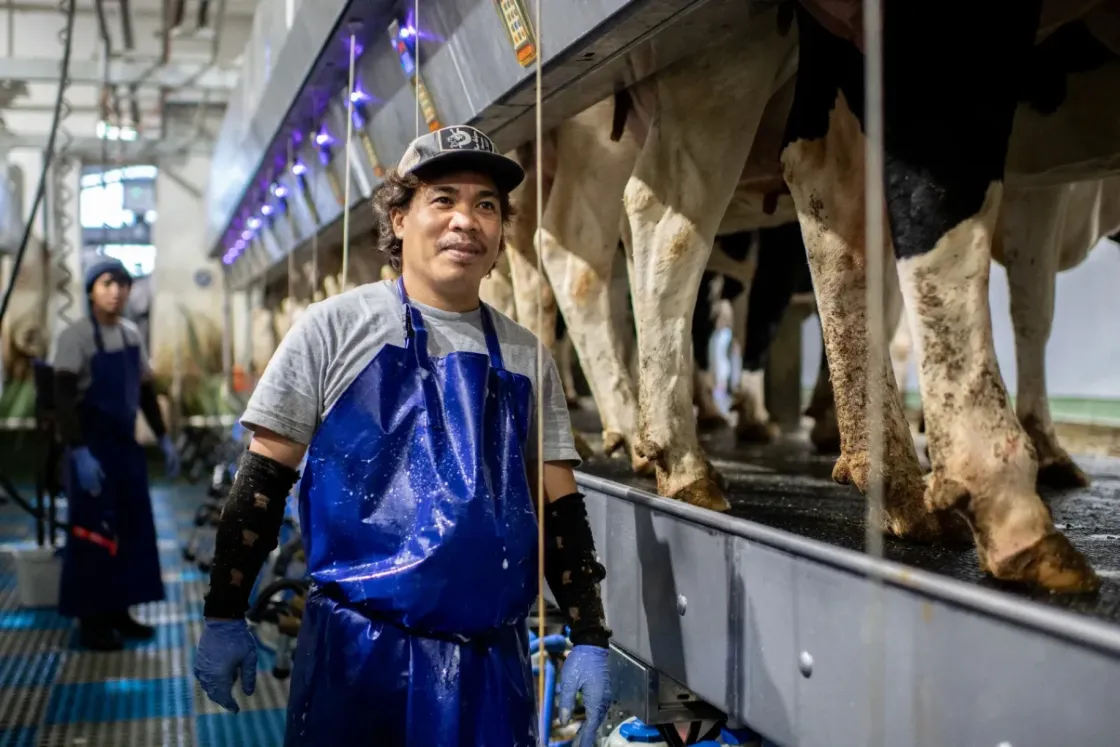
"Kaposvár has had guest workers for some time, but here in southern Somogy the labour shortage has only worsened recently. We figured that if we were going to bring in workers from abroad, they should definitely be Filipinos," says Barna Egyed, chairman of the Bos-Frucht Agricultural Cooperative, about why they decided to hire six Filipino workers for their facility in Homokszentgyörgy. The company had been looking for employees for milking cows, but they couldn't find anyone willing to do the job in the rural region around them. So they turned to a recruitment agency to find guest workers, which Egyed says is what more and more people are doing anyway.
"This is happening all over the country. It started in the west, then it reached the east. It was easier for those living in the western region of the country to go over to work in Austria, but by now there is a labour shortage elsewhere too, not just near the border," Egyed says, adding that it is difficult to find workers for animal husbandry anyway. But the Filipinos "worked out well" and the village accepted them quickly. According to Egyed, one of the reasons for this is that Filipinos are Christians.
Hungarian-speaking cows
Homokszentgyörgy is a village of just over 900 people near Szigetvár. As one arrives via Kossuth Lajos Street, the village's two churches are the first things to notice, and then the closed post office at the end of the street catches the eye. If we had taken a right, we could have joined the long queue of locals waiting to receive their parcels in front of a minibus marked Hungarian Postal Service. But we headed left, towards the cattle farm, one of the biggest enterprises in the village situated near Hungary’s border with Croatia.
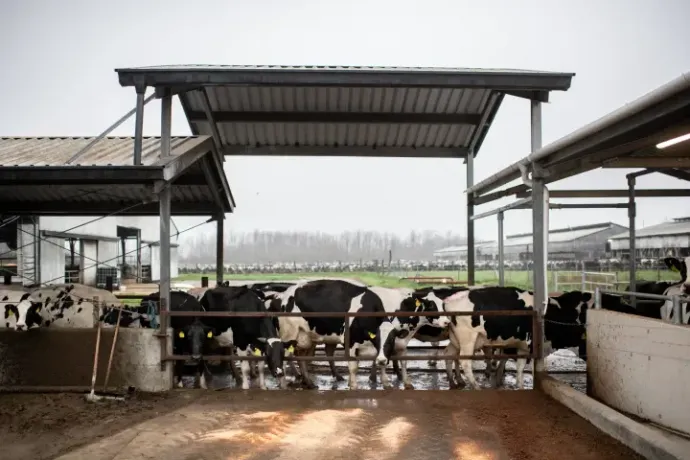
The facility, which has been operating in Homokszentgyörgy since 2007, hired foreign workers for the first time in its history at the end of November this year. We were welcomed at the company's office by Barna Egyed, who quickly explained why this was necessary. As he says, raising cows has always been a tradition in the village, but livestock farming is now gradually disappearing from the area. At the same time, there are not many people willing to work in the industry.
"We are missing a generation that would replace the older generation who knew how to keep animals at home. However, it is difficult to draw in the young these days: they either go to work in nearby Barcs or Kaposvár, or move on to Budapest or take jobs abroad. They might come back at a later point, but we have to find a way to operate in the meanwhile."
Egyed says that they sometimes get young people from the agricultural college in Kaposvár, but not many. They started expanding a new facility two years ago, and they already knew back then that they would need to hire new manpower. When they couldn't find any Hungarians, they finally started to look for foreigners: the Filipinos had the advantage of "being people who can integrate easily and quickly, who come from a Christian culture and who speak English well".
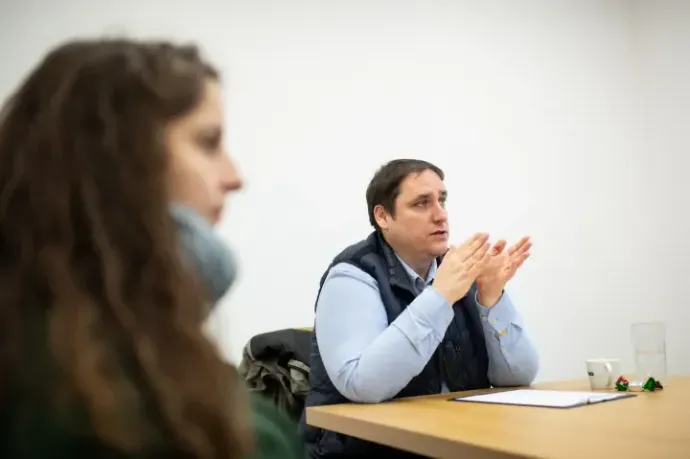
This is how, after successful interviews, the company hired six Filipino workers (who have left their family at home) aged between 24 and 30 who settled in quickly. Egyed explains that there were some difficulties at the beginning, mainly because "they found our language very difficult, and we found their language very difficult". Since then, they have been using translation software to communicate with Hungarian colleagues who may not speak English, and "they have learned how to say hello in town in Hungarian. They have also learned to say 'gyere be' ('come in' in Hungarian – TN) for the cows' sake". This really does make a difference, the cows heed the familiar command words.
There’s work to be done all year round
Egyed also explains that raising cows is particularly hard work. They have 40 employees for 660 animals, "in pig or poultry farming, a smaller workforce is enough for a much bigger herd". Meat production is much more automated than milking cows, and the life cycle of the animals is long here as well. They also recognise that "agriculture and livestock farming are not an attractive industry in terms of employment anyway". Egyed and Cintia Pupos, the farm manager, give us a tour of the farm. We first visit the milking parlour, where two Filipino workers happen to be on shift. One of them is cleaning the udders one by one. He wipes them and then puts the cup on top: "from this point on, the process is automatic," Cintia Pupos explains.
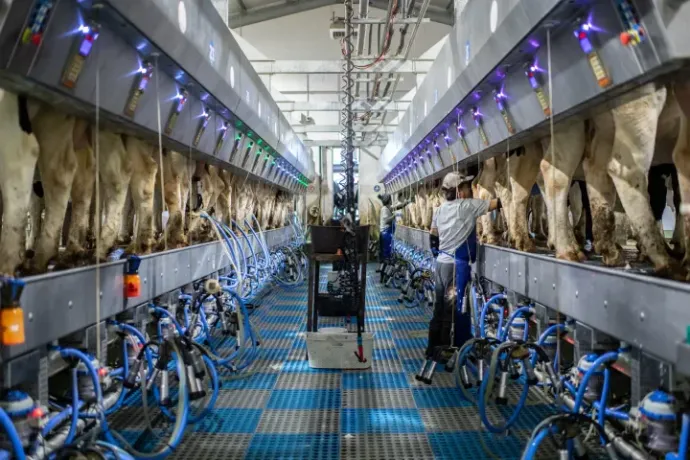
They produce a truckload of milk a day on the premises. For this to happen, they milk the animals in three shifts, at 7am, 3pm and 11pm. "That's four udders to milk three times six hundred times a day," Egyed says, doing the maths for us about the daily load. That's why we needed labourers, she adds, "who come in to work in both winter and summer, because you can't leave the animals, they have to be milked. This job requires a 365 day-presence."
In addition, three of the six guest workers had previous experience in animal husbandry, one in Saudi Arabia and the other in Japan: Egyed explains that this was important because "we've already tried people who said they wanted to work here, who "don't mind the animals". But then it turned out that they did".
"Plus, in this part of Somogy, it is difficult to find workers willing to come to work on New Year's Day."
We then stroll through several other sections of the facility, while the smell of fermented fodder, animal and mild manure alternate as we walk. "Many people are also bothered by this smell, the smell of the animals," Cintia Pupos says when we arrive outside. She says that summer and winter are also difficult, as many people can't handle the fact that here "you have to milk cows even when it's snowing outside". While she is talking about this, we stop by a recently born calf and watch the stereotypical character of dairy farms, a cat, run up to it. Cintia proceeds to tell us that the little ones are "always named after their mother, for example, if mum is sulky, the calf will be named "Sulky".
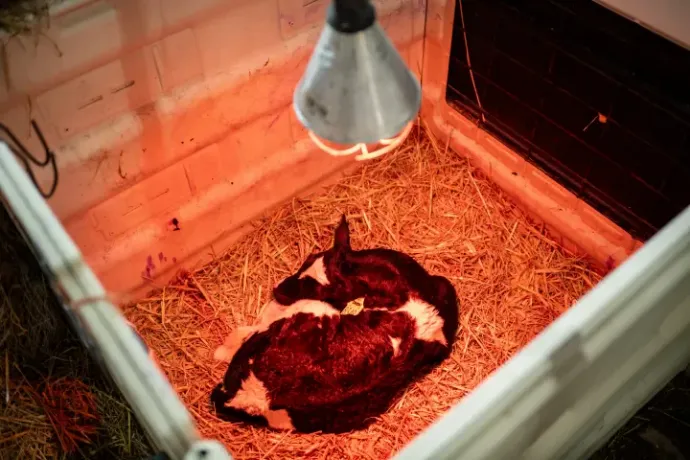
Christianity and the West
Barna Egyed then goes on to say that when contacting the recruitment agency, they specified that they didn't want Indian or Mongolian recruits, With the Filipinos it was important that they were from a Christian culture. This is also important for the people of the village". Egyed adds that he had seen Filipinos at work before, in a slaughterhouse or in the automotive industry, "they did a good job there too, they were pleased with them". They were looking for people who would be able to fit in and preferably stay as long as their residence permit allows. "The cow is a sensitive animal, it knows the schedule, but it may also refuse to go into the milking parlour if it sees a stranger there," Egyed says, explaining why it's not good for them to have frequent turnover of personnel.
The current guest workers received a permit for nearly one and a half years, which can be renewed once. The company would be happy to keep them on for the entire period, and as we talk to one of the workers, it turns out that they are also satisfied. Compliza Janil Camaring has worked with cows in Saudi Arabia before, and he submitted his CV for a job in Europe through a recruitment agency at the suggestion of family friends. He has a young daughter at home which made it difficult for him to decide to come, but "I can support her this way. Finding work in the Philippines is difficult. If you are self-employed, the pay is low, in the public sector it is a bit better". He adds that he also likes the village here, "people are nice".
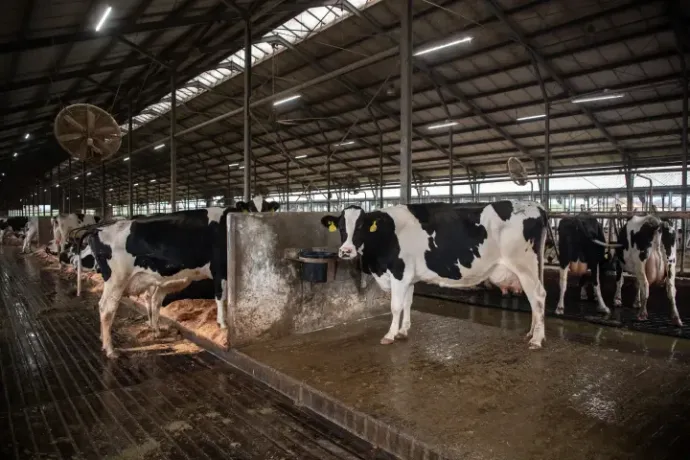
Egyed says that on the whole, it can be said that the Filipino workers have adjusted to life in the village: "Everyone knows them, they know that they ride their bikes to work in the morning and they are always smiling".
The six workers live in the same house. The recruitment agency requested that a maximum of two people share a room and that each room have its own bathroom. The company ended up buying a house from a local who had moved away and converted it accordingly. They found it better than letting the recruitment agency put the workers up somewhere nearby.
"The Christian religion has contributed much to them having a good relationship with the village. There is a Filipino church in Budapest, they usually go there on their days off."
– Egyed says, adding that the locals have also been welcoming. To ensure this, "we started communicating early on that they would be coming and that the locals shouldn't be scared". "There have at times been problems in some other counties, where the labour shortage appeared sooner because of the Austrian job opportunities. The workers there were Indian – it's a different religion, it's a different look, so there was alarm, especially as it coincided with the big refugee crisis". However, he says that since then these fears have subsided and the Filipinos are "similar in both appearance and attitude, so they don't notice them much in the village".
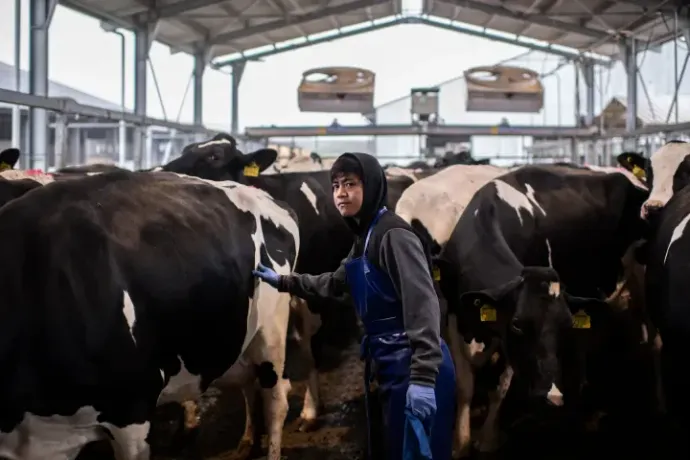
After leaving the facility, we go to the village grocery store, where they confirm what we have already heard. "They greet us in nicely, they tell us what they want, sometimes they translate it over the phone and then they show it to us. It wasn't a big deal in the village that they were coming", we find out from two local women. The village mayor, János Czinke, agrees, saying that "there is no problem with them, they are not bothering the population, they are behaving normally. They are trying to fit in, but we only see them when they leave home to go to work".
Czinke adds that "not everyone is keen to work in a cowshed", so he understands the need for bringing in labourers because "more and more people from the village are commuting for work to nearby towns". Czinke's concluding sentence also clarifies for the common man how the hospitality extended to migrant workers can be reconciled with the anti-migrant communication the government has been cultivating for years: "They aren't troublemakers like the migrants we hear about from Western Europe. They know they would be playing with their jobs".
For more quick, accurate and impartial news from and about Hungary, subscribe to the Telex English newsletter!